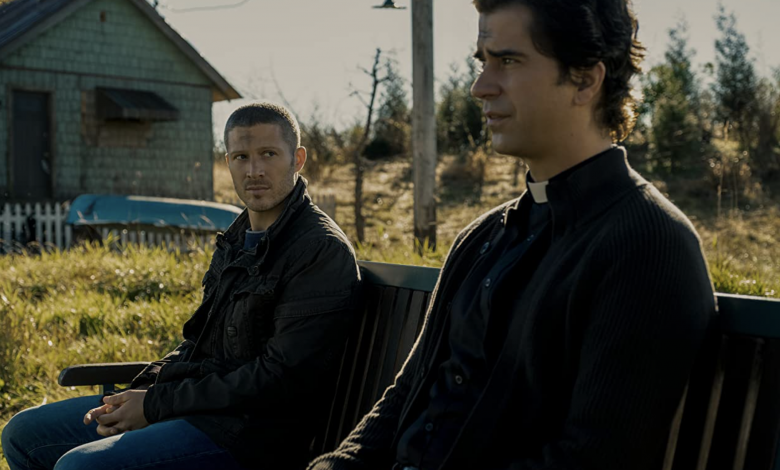Midnight Mass: A Criticism of Organized Religion

Zoe Wiebe ‘25 / Emertainment Monthly Assistant Film Editor
Mike Flanagan’s highly anticipated new show Midnight Mass premiered on Netflix on September 24 to mainly positive reviews. The third in a horror anthology for Netflix— after The Haunting of Hill House and The Haunting of Bly Manor— Midnight Mass is a religious thriller that takes place on Crockett Island, a run down town with a dwindling but devout population. Flanagan’s well timed jumpscares and ability to instill a deep-seated fear and dread were on full display throughout the show’s seven episodes. Spoilers ahead.
While the island’s regular pastor, Monsignor Pruitt, recovers from an illness on the mainland, a new pastor, Father Paul, arrives on the island and strange things start happening: thousands of dead cats wash up on the beach, a paralyzed girl starts walking, a young, healthy woman miscarries, and an old woman suffering from dementia gets younger every day. While still a secret to the town, it is revealed to the audience that while Monsignor Pruitt was on a pilgrimage in Israel, he was caught in a sandstorm and hid in a cave, where he met an angel of God. When the Angel bites and drinks Pruitt’s blood, Pruitt returns to his younger self and goes back to Crockett as Father Paul without anyone recognizing him. Under Father Paul’s guidance, there seems to be a religious revival in the small town and the number of church-goers increases every week. However, things aren’t as they seem, as Father Paul begins asking increasingly questionable requests of his congregation, culminating in him asking them to ingest poison in order to die, resurrect, and then have eternal life. After many of the attendees drink the poison and wake up as blood-thirsty vampires looking to spread their contagion throughout the world, it is up to the atheists, muslims, and commonsensical Christians of the town to save the world. They figure out that Monsignor Pruitt, masquerading as Father Paul, has been mixing blood from the angel with communion wine for weeks, which causes dead cells to regenerate, allowing the congregation to resurrect but also turning them into vampires.
A huge theme throughout Midnight Mass is the criticism of organized religion. Flanagan’s message is clear: systems in place within religious institutions can lead to corruption. Throughout the show, the religious folks in town become increasingly willing to engage in rash and objectively terrible decisions in the name of their Lord because their leaders tell them to or because they have “permission” from the Bible. For example, the town zealot, Bev Keane and her lackey, Sturge, throw several molotov cocktails into a home in an attempt to smoke out the group who refuses to join their bloodthirsty clan. When Sturge reminds Bev that they should put the fire out before the whole island catches, Bev quotes scripture from Revelations, “the first angel blew his trumpet and there came hail and fire mixed with blood and they were hurled to the earth,” to justify letting the fire burn, and burning every other building on the island to the ground as well. Obviously, the scripture in no way indicates that they should burn down an entire island, but they use it as license anyway. Herein presents one of Flanagan’s criticisms of institutionalized religion: using scripture as a warrant to commit atrocities in the name of God. In the fourth episode, Father Paul, now a vampire, murders and drinks the blood of a member of the town. When Bev Keane stumbles upon the horrific scene, she admonishes two church-goers for being uncomfortable with hiding the body, saying, “Monsignor Pruitt himself is a miracle of God. And a performer of miracles… God has a plan, He’s working through [Pruitt] and we are to do our part.” Here is an example of zealous churchgoers distorting the Bible for personal gain. This also demonstrates forsaking God as a leader and following human leadership instead. This idea is especially prominent when Bev calls on Pruitt to lead the now vampiric town. He responds with “No. It was never me. That’s the thing about the priesthood, it’s never supposed to be about me. It’s supposed to be about God.” This realization about the fallibility of man demonstrates where the town has diverged from true Christianity.
While the criticism of organized religion is painfully clear, it is unclear if Flanagan also attempts to criticize the belief in God. By focusing on the more grim aspects of the Bible (Angels that strike fear, resurrection, death, the Book of Revelation, etc.), Flanagan presents God and the Bible as horror. Further, the show leaves a few key details ambiguous. For example, it is never resolved whether the miracles performed or the Angel were really from God, or if the strange occurrences on the island could have been a collective delusion brought on by the blood that the townspeople had been drinking for weeks. If these terrifying aspects are really from God, then Flanagan purports that God is not the compassionate deity that he is said to be. Additionally, with atheists and skeptics posited as the heroes of the show, one can’t help but wonder if Flanagan is criticizing more than just Christianity as an institution.
So, is Flanagan just condemning organized religion? Or is he condemning God as not the benevolent being that Christians believe he is? It is more likely that the show is a warning to take a closer look at who you follow and not to put your faith in people. Especially those like Bev Keane and Monsignor Pruitt, who will turn you into blood sucking vampires that catch fire in the sun.